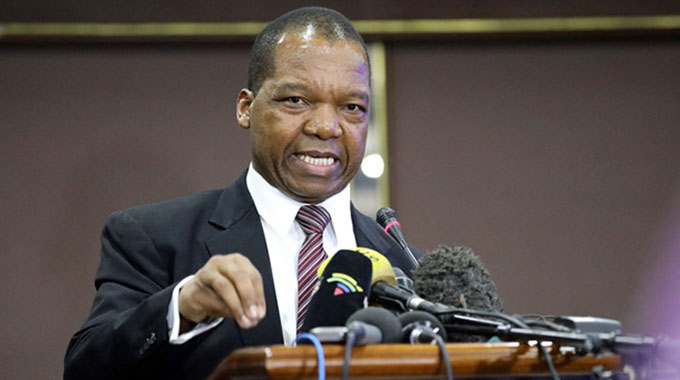Editorial Comment: Efforts to tame inflation commendable

The continual battle against inflation has to address some underlying economic fundamentals, mainly the growth in money supply, which can be sorted out by economic reforms and the desire of the authorities for a “soft landing” that keeps growth rather than a sudden downturn.
But much of the pressure, and the slowness of the decline in inflation rates comes from other sources that are not connected to economic fundamentals, and in particular from speculative behaviour, some deliberate and akin to profiteering while some is a reaction to fear of being left in the lurch.
So the meeting at the end of last week between the Reserve Bank of Zimbabwe (RBZ) and the leaders of the manufacturing and retail sectors was important in finding out what people are thinking, why they act as they do and what can be done.
At the heart of the problem, at least at the heart for those who yearn for greater stability and a more normal environment rather than those trying to maximise profits, is the black-market exchange rate.
While some major businesses start with actual costs when working out their prices, and then add their standard margins, others simply set a US dollar price and then convert to local currency using the black market rate, which does not have much grounding in reality.
But some of those doing this are major businesses, and so their decisions affect all of us.
There are those, as Reserve Bank Governor Dr John Mangudya noted, who see US dollars as a medium of exchange within Zimbabwe rather than as the global trading currency needed for imports.
And even when converting currencies see the black market, a much smaller market than the real ones, as setting their exchange rate rather than the weekly auctions.
So we get, even when we are talking about locally-made goods whose foreign currency components are supplied by the auctions, pricing using the black market rates on their costs that they have converted into US dollars even when they are in local currency.
Dr Mangudya noted that up to 85 percent of the goods on supermarket shelves are now locally manufactured or locally produced. That means the retailers can buy them for local currency, the same local currency they get from their own customers, and the producers can buy their currency on auction and can cost with actual costs and apply fixed margins.
All of that means that inflation rates should be declining. Prices will still be rising regularly because inflation is far from being beaten down to low single figures, and that is even reflected in the bids presented at the auctions which show buyers on that market expect exchange rates to be roughly inflation neutral, neither pushing nor trailing inflation, which is rational.
Instead Dr Mangudya noted that some retailers price according to the black market rates, even when their costs are not in foreign currency, and we would go further and note that a range of manufacturers do the same and pass those higher costs onto the retailers who have little option, but to pass them onto their own customers.
Matters are made worse, even among those who do wish to operate within the environment of actual costs, that they fear that with inflation they will not be able to meet their replacement costs. A serious manufacturer or retailer is not extending credit and realises that they will be paid soon after the latest batch of goods has been made and dispatched, or soon after it goes on the shelves, since they do not keep several months of supply in a warehouse.
So modest inflationary price changes can be absorbed into the normal mark-ups. But when they hear what others are doing, and hear the predictions about the black market rate, they can become afraid that they might be selling goods below the actual cost.
This is besides those who simply start with the black market rates and are thus contributing to inflation.
Last year there was a period when there were growing delays between allotments of foreign currency and the actual transfer of those allotments to the bank accounts of bidders for onward and automatic transmission to their external suppliers who had supplied the invoices to back the bid in the first place.
That did create some legitimate fears that those needing auction currency for approved priority goods would have to revert to the black market.
In retrospect, since the reformed economy now sees higher inflows than outflows of foreign currency, it would have been better for the authorities in both the Reserve Bank and the Government to have worked out how to get a greater percentage of those inflows into the auctions, rather than have delays.
Dr Mangudya needs to take that into account, but those telling him these things also need to realise they must play their part.
The auction last week saw 28 percent of bids on the main auction and 22 percent of bids on the SME auction rejected.
They were not rejected because they were too high or two low, but because they did not meet the rules set by the Reserve Bank, despite the fact that they now have to be presented to banks around a week in advance and banks are supposed to do the initial gate-keeping.
The Reserve Bank rules and the advance submissions are both designed to ensure that all bids are genuine bids, backed by real local currency sitting in the bidder’s bank account, for genuine invoices for goods that are needed by the bidder.
Instead over the last year, the Reserve Bank has found a significant minority of cheats speculating, arbitraging between official and black market rates, and trying to stock up on currency, not goods.
We happen to be in the same country, the same economy and so have to work together if we want things fixed. The Monetary Policy Committee of the Reserve Bank does include some respectable outsiders, and there has never been a bar on representatives of the formal and rule-abiding sectors making their submissions if they see ways the systems could be improved.
But progress needs this continuous interaction, with more information from the Reserve Bank and more detailed submissions from the respectable business houses. This is why that meeting last week was important, and why one every three months is probably too infrequent.
With the economic fundamentals now fixed, a major achievement of the Second Republic and the one on which all our growth and progress depend, the old ways are now the wrong ways.
That requires a change in mindset in business, where most executives have spent their whole career in the wrong ways, more openness from the Reserve Bank and a greater determination to bring the corrected fundamentals up to the surface so we have a normal flourishing and growing economy.










Comments